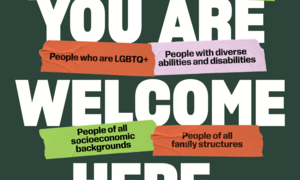You Are Welcome Here


School hardening policies—such as the presence of police and security, metal detectors, and harsh discipline codes—contribute to a criminalization culture in schools and students being pushed out of classrooms and into the school-to-prison pipeline. For Black girls, this criminalization culture causes serious additional harms.
May 3 is the Freedom To Learn National Day of Action, a day of advocacy for inclusive education and young people’s freedom to read, learn and build a just future. Our collective responsibility is to counter disinformation, uplift honest history and engage our communities to serve all children.
Do you believe in strengthening our democracy? Do you support a more inclusive society? In responding to book bans, educational censorship and attempts at excluding some communities from public school spaces, Learning for Justice’s magazine and publications offer guidance and inspiration on critical issues in education.
The rise in antisemitism and Islamophobia in the United States requires us all to help ensure children’s right to an education free from bigotry in an inclusive and supportive environment. Our newest article provides essential overviews of Islamophobia and antisemitism and context for how these forms of hate and bias can manifest in schools. The accompanying toolkit shares practical guidance, strategies and resources for countering bigotry and fostering safer and more inclusive culture in schools and communities.


When it comes to investing in racial justice in education, we believe that the South is the best place to start. If you’re an educator, parent or caregiver, or community member living and working in Alabama, Florida, Georgia, Louisiana or Mississippi, we’ll mail you a free introductory package of our resources when you join our community and subscribe to our magazine.